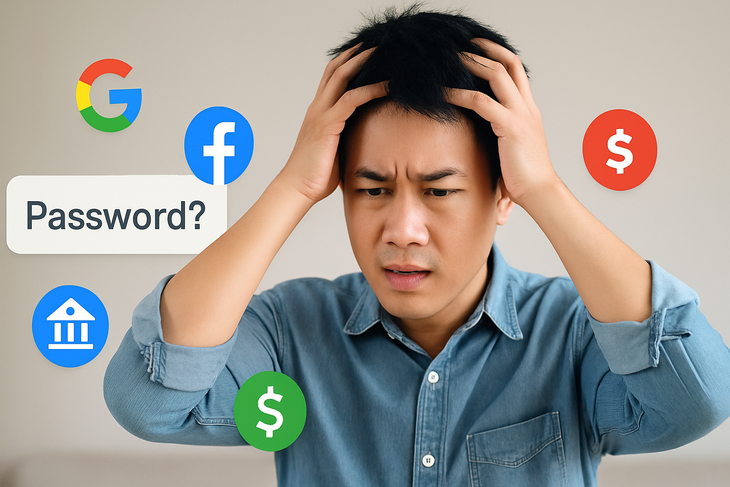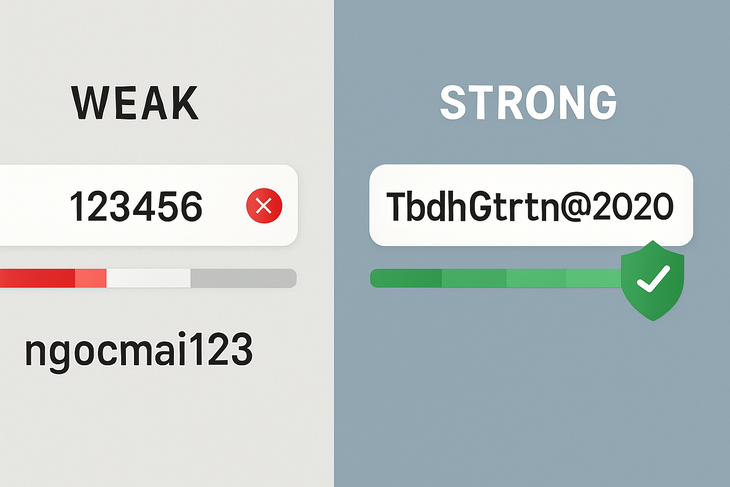
Setting a secure yet memorable password is always a headache.
In the digital age, where all transactions, communications and personal information are tied to online accounts, passwords become the first “lock” layer to protect you from cyber attacks.
Yet many people are still using passwords like “123456” or “matkhau123” without considering the consequences. So how do you create a truly secure password that is difficult to guess but still easy to remember?
What is an "unguessable" password?
According to a report from Verizon (USA), more than 80% of data breaches are related to weak or leaked passwords. An easy-to-guess password like "123456" or "admin" can be hacked in seconds using brute-force tools.
A strong password will effectively prevent these attacks, protecting your personal information, finances, bank accounts and privacy.
A password is considered "unguessable" when it meets several important criteria of length, complexity, and uniqueness.
First of all, passwords should be at least 12 characters long, as each additional character increases the decryption time exponentially. Strong passwords should incorporate a variety of characters, including uppercase and lowercase letters, numbers, and special characters like !, @, #, etc.
Also, avoid using easily guessable personal information such as your name, date of birth, phone number or address. Common patterns such as "123456", "qwerty" or "iloveyou" are also less secure options, often the first thing hackers try.
In addition, users should not reuse old passwords or use a common password for multiple accounts, because if just one account is exposed, the entire data system can be threatened.
Formula for creating easy-to-remember yet 'super strong' passwords
There are many creative ways to create strong passwords that are easy to remember, avoiding the need to write down or reuse old passwords. One effective method is to use mnemonic phrases.
You can pick a favorite saying, abbreviate each letter of it, and add numbers and special characters. For example, the sentence "I started learning guitar in 2020" can be converted to the password TbdhGtrtn@2020.
Another way is "impossible combination", which is combining two unrelated words, like "CaHeo" and "BanhMi", then adding numbers and special characters to create a password like CaHeo!23@BanhMi.
Finally, you can use a long passphrase consisting of many words that have no logical connection but are easy to remember, such as TraiCay!NuocBien&LaBanMai. This makes the password both highly secure and close to your memory.
Or some other more interesting formulas according to Tuoi Tre Online such as "Platform name + abbreviation + 123". For example, if your name is Nguyen Van A, it will be TiktokNVA123, GmailNVA123. The advantage is that it will be easy to remember and difficult to hack, but on the contrary, each platform will have its own password.
There is an even simpler thing that few people do, which is alternating between lowercase and uppercase letters in the alphabet.

The more complex the password, the more secure it is.
Don't trust your memory!
Many people have a habit of trusting their memory and thinking that they can remember all passwords, thereby creating short, easy-to-guess and insecure passwords. However, this is a common mistake that can easily lead to security risks.
An effective solution is to use password managers like LastPass, 1Password or Bitwarden, which help store, encrypt and autofill passwords securely and conveniently.
Additionally, you should enable two-step authentication (2FA), an additional layer of security that helps protect your account even if your password is compromised, by requiring a verification code to be sent to your phone or personal email.
Common mistakes to avoid
When using passwords, many people accidentally make common mistakes that make their accounts vulnerable to attacks. One of the serious mistakes is saving passwords in phone notes or Word files without any form of encryption, which makes it easy for bad guys to access if the device is lost or hacked.
In addition, using the same password for multiple accounts is also extremely risky because if just one account is exposed, all the remaining accounts are threatened.
Some people even send passwords to relatives or colleagues via email, Zalo, Facebook Messenger without realizing that these platforms are vulnerable to information interception.
Finally, failing to change your password regularly, especially after a data breach alert, is a costly mistake.
Strong passwords are the foundation of digital security
In an increasingly complex digital world , a strong password is not just a layer of protection, but the difference between safety and loss. Creating and managing passwords properly is not difficult, as long as you take it seriously. Remember: a moment of laziness can mean a lifetime of information exposure.
Source: https://tuoitre.vn/mach-ban-nhung-cach-de-co-mat-khau-sieu-manh-20250806110407315.htm


![[Photo] Da Nang: Hundreds of people join hands to clean up a vital tourist route after storm No. 13](https://vphoto.vietnam.vn/thumb/1200x675/vietnam/resource/IMAGE/2025/11/07/1762491638903_image-3-1353-jpg.webp)















































































































Comment (0)